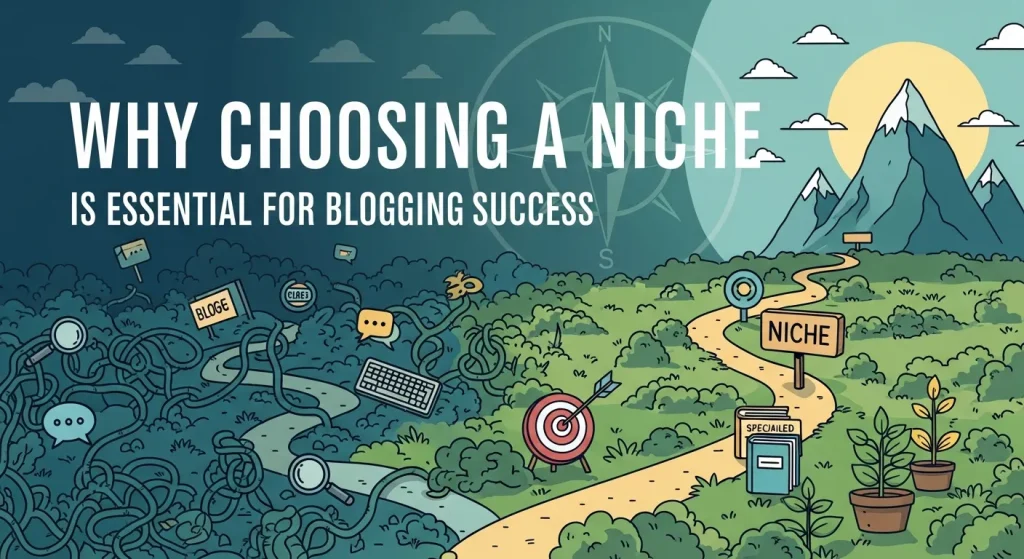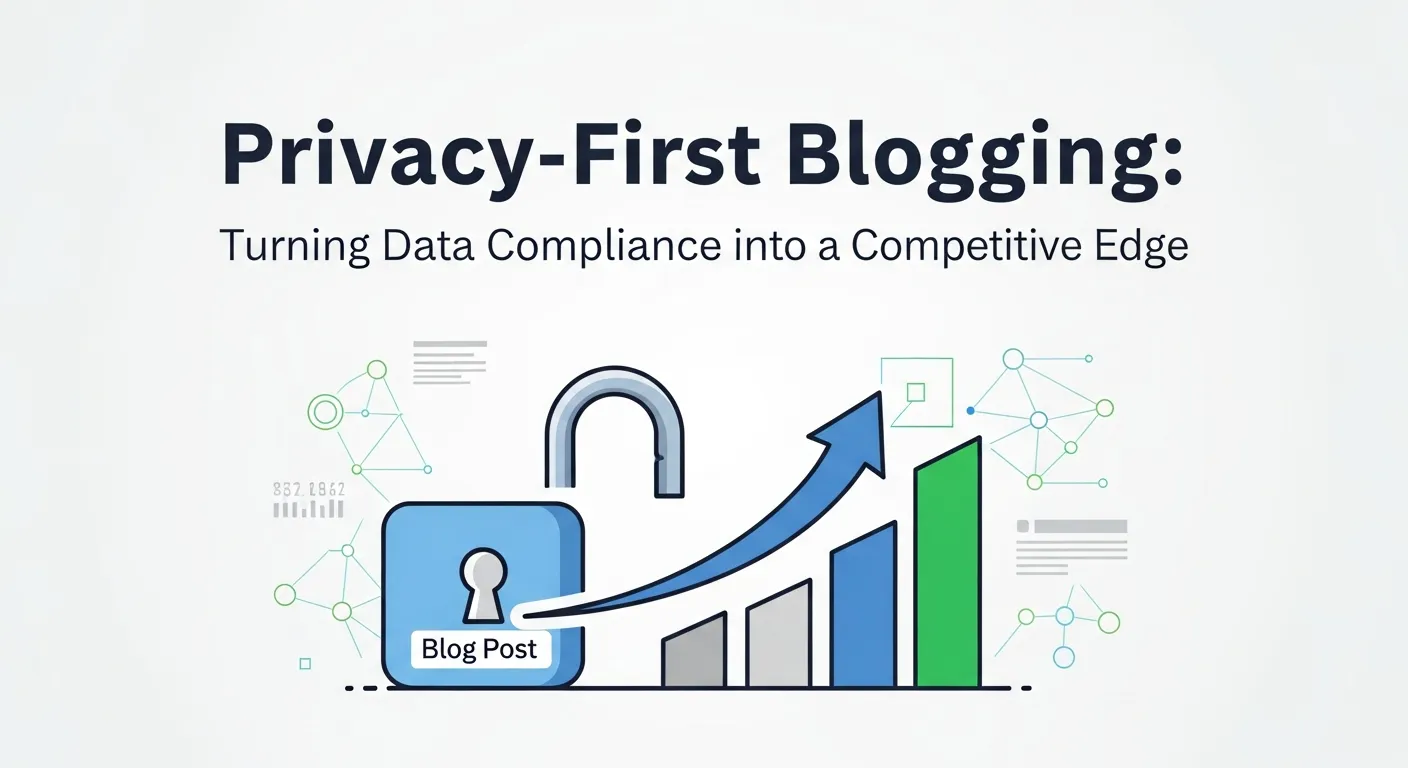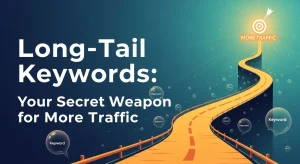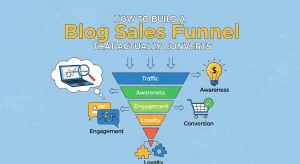Why Choosing a Niche is Essential for Blogging Success

Mastering blogging success starts with choosing a niche that balances your unique passion with market demand, transforming a simple hobby into a high-authority, revenue-generating digital asset.
This guide explores why a focused niche is the cornerstone of authority, SEO, and monetization. We provide a step-by-step roadmap to selecting a topic, analyzing competition, and leveraging modern AI tools to ensure your blog stands out in a crowded digital landscape.
Why Choosing a Niche is Essential for Blogging Success
The digital world is more saturated than ever. In an era where millions of posts are published daily, the “generalist” blog is a relic of the past. To achieve true blogging success, choosing a niche is no longer optional—it is the strategic foundation upon which your entire brand is built.
By narrowing your focus, you cease to be a “jack of all trades” and instead become a “master of one.” This transition allows you to cultivate a brand voice that resonates deeply with a specific demographic, making your content indispensable.
What is a Niche and Why Does it Matter?
At its core, a niche is a specialized segment of the market for a particular kind of product or service—in this case, information. What is a niche in blogging? It is the intersection of your expertise, your passion, and a specific problem that a group of people needs solved.
When you prioritize brand positioning, you aren’t just writing; you are claiming a territory in the reader’s mind. Whether you are focusing on luxury brand marketing strategy or “vegan keto recipes for athletes,” your niche defines your brand personality in marketing.
The Strategic Advantages of Niche Blogging
| Feature | General Blog | Niche Blog |
| Audience Loyalty | Low (Readers are transient) | High (Community-driven) |
| SEO Authority | Hard to rank for broad terms | High (Easier to dominate long-tail keywords) |
| Monetization | Low conversion rates | High (Targeted affiliate/sponsored offers) |
| Brand Authority | Diluted | Expert status |
Building Brand Authority and Loyalty
Blogging success is heavily dependent on trust. A personal brand strategy thrives when readers know exactly what to expect from you. If you write about digital payment solutions one day and “organic gardening” the next, your brand consistency suffers.
Consistency fosters brand awareness. When you provide specialized value, you move through the customer journey mapping process faster, turning a first-time visitor into a brand advocate. This is the heart of consumer brand marketing: being the reliable answer to a specific question.
Dominating Search Engines (SEO)

For many, the path to blogging success is paved with organic traffic. Choosing a niche allows you to implement a more effective SEO audit guide for your own site.
Semantic Relevance and Topical Authority
Search engines like Google use algorithms to determine if you are an expert. By focusing on a niche, you can cover a topic “horizontally” and “vertically.” For example, if you specialize in Local SEO services, you shouldn’t just write one post. You should create an ultimate guide to dental SEO, a guide on Amazon SEO, and content regarding YouTube SEO. This builds “Topical Authority.”
Advanced SEO Strategies
- Answer Engine Optimization (AEO): Crafting content that AI-driven search engines (like Perplexity or Gemini) can easily cite.
- Video SEO: Integrating video content to capture the YouTube SEO market.
- How AI Transforms SEO: Using AI writing tools for bloggers to generate outlines and research, while maintaining a human brand voice.
Maximizing Monetization and Passive Income
One of the most sought-after goals is achieving passive income through blogging. However, advertisers and affiliate programs look for high brand alignment.
If your niche is SaaS development services, you can command higher rates for sponsored posts than a general lifestyle blog. Brands want to see a high brand equity within a specific demographic. Whether it’s Amazon SEO tools or luxury brand marketing services, a niche blog offers a “warm” audience ready to convert.
Diversified Income Streams:
- Affiliate Marketing: Promoting products like digital payment solutions or SaaS tools.
- Outbound Email Marketing: Building a list of niche-specific subscribers.
- Media Buying Services: Selling ad space to industry-specific vendors.
Leveraging AI and Modern Marketing Tools
In 2026, blogging success involves working smarter. AI driven trend marketing allows you to see what topics are about to explode. Tools like automated branding and predictive trend marketing can help you stay ahead of the curve.
Using AI writing tools for bloggers helps in how to optimize blog posts for readability and SEO. However, remember that brand storytelling and a unique brand voice strategy are things AI cannot fully replicate. Your human perspective is your “moat.”
Marketing and Promotion Strategies

Once you’ve settled on a niche, you must know how to promote your blog.
Inbound vs. Outbound Marketing
- Inbound Marketing: Creating high-quality content that draws people in (e.g., Smart blogging strategies).
- Outbound Marketing: Reaching out via outbound email marketing or SMS marketing to bring your content to the audience.
- Viral Content Marketing: Using the psychology of trend marketing to create shareable “viral” posts on TikTok or Instagram.
Building Reputation
Your digital reputation management is crucial. Use review management services if you sell products, and maintain a strong presence through online PR services to build brand resilience strategies.
Step-by-Step: How to Choose a Profitable Niche
Step 1: Identify Passion and Market Gap
Analyze your interests through the lens of competitive brand analysis. Is there a sub-niche that is underserved? For example, instead of “Marketing,” focus on Ethical branding or Sensory branding.
Step 2: Use Data-Driven Research
Don’t guess—validate. Use high-authority tools like SEMrush or Ahrefs to check search volume. Look for “Low Competition, High Volume” keywords. This is the secret to how to choose a profitable blog.
Step 3: Define Your Brand Architecture
How will your niche grow? Consider your brand architecture. Will you eventually offer SaaS development services or app development services? Plan for the future brand extension marketing.
Step 4: Technical Optimization
Ensure your blog is technically sound. Learn how to improve blog’s page speed and follow a guide to mastering WordPress. A slow site kills user experience and branding.
To further solidify your path to blogging success, choosing a niche requires an understanding of where the industry is moving. Here are five additional sections—including the critical “Future Opportunities” segment—to integrate into your article.
Mastering E-E-A-T: The Human Advantage

In the age of AI, search engines have pivoted toward E-E-A-T (Experience, Expertise, Authoritativeness, and Trustworthiness). While AI can synthesize facts, it cannot replicate “Experience.” To ensure blogging success, your niche content must include “I” statements: “In my experience testing this software…” or “When I traveled to this remote village…” This human-centric brand voice is what protects your blog from being replaced by automated summaries.
Transitioning to Answer Engine Optimization (AEO)
Beyond traditional SEO, the future lies in Answer Engine Optimization (AEO). This involves structuring your niche content so that AI-driven search engines (like ChatGPT, Perplexity, or Google’s AI Overviews) can easily cite you as a source. By using clear headings, bulleted summaries, and structured data, you position your blog to be the “primary source” for AI answers, driving high-value traffic even when users don’t click traditional links.
Diversifying Through Multi-Channel Brand Marketing
Blogging success no longer happens on a single website. You must adopt an integrated marketing approach. If your niche is “Sustainable Fashion,” your blog serves as the hub, but your brand marketing should extend to Viral Marketing on TikTok for awareness and SMS marketing for direct sales. This creates a brand resilience strategy that isn’t dependent on a single algorithm.
Building Community-Led Growth
The most successful niche blogs are moving away from being “publications” and toward becoming “communities.” By utilizing customer journey mapping, you can identify where your readers feel isolated and provide a space for them. Whether through a private Slack channel, a Discord server, or creative webinar ideas, fostering community increases brand loyalty and creates a “moat” around your business that AI cannot cross.
Privacy-First Blogging: Turning Data Compliance into a Competitive Edge

In 2026, blogging success is as much about data ethics as it is about content. With the full implementation of the EU AI Act, India’s DPDP Act, and various U.S. state privacy laws, the era of third-party tracking has ended. For bloggers, this means shifting toward a First-Party Data Strategy.
The Power of First-Party and Zero-Party Data
Choosing a niche makes data collection easier and more ethical. Because your audience is specific, they are more willing to share “Zero-Party Data”—information they intentionally give you (like preferences in a quiz or survey) in exchange for specialized value.
- First-Party Data: Information you collect directly (website behavior, email engagement).
- Zero-Party Data: Information the user explicitly tells you (e.g., “I am a beginner at vegan cooking”).
Future Opportunities: The Next Frontier of Blogging
As we look toward 2027 and beyond, choosing a niche will involve emerging markets that are currently underserved. The following areas represent the biggest growth opportunities for new and established bloggers:
- AI Agent Orchestration & Ethics: Explaining how to manage multiple AI tools in a business workflow.
- Hyper-Local Micro-Travel: Focusing on specific “hidden gems” and domestic travel to avoid the saturation of international travel blogging.
- Health-Tech & Wearable Data: Analyzing the surge in bio-hacking and personalized health data.
- The “Human-Made” Economy: A niche dedicated to artisanal, handmade, and non-AI-generated products and services.
- Sustainable Tech & Green Computing: Helping businesses and individuals reduce their digital carbon footprint.
Comparison Table: Future-Proofing Your Niche
| Opportunity Strategy | Implementation Detail | Target Metric |
| AEO Implementation | FAQ sections & Structured Schema | AI Citations/Mentions |
| Interactive Content | Quizzes, Calculators, & Polls | Time on Page / Engagement |
| First-Party Data | Lead Magnets & Newsletters | Email List Growth |
| Short-Form Video | Vertical Video (TikTok/Reels) | Brand Awareness |
Conclusion
True blogging success is a marathon, not a sprint. By choosing a niche, you give yourself the competitive edge needed to build brand equity, master search engine optimization, and create a lasting personal brand strategy. Focus your efforts, serve your audience deeply, and your blog will transform from a simple site into a powerful industry authority.
FAQs
1. What is the most profitable niche for blogging success in 2026?
While “Finance” and “Health” remain high, niches involving AI driven trend forecasting, SaaS development services, and sustainable marketing are seeing massive growth due to high brand interest and advertising spend.
2. Can I change my niche later?
Yes, this is called a brand refresh. While it’s better to start specific, many bloggers use brand adaptation strategies to pivot as they learn more about their audience’s brand perception.
3. How do I know if a niche is too small?
Check the search volume for your primary keywords using tools like Google Keyword Planner. If the total monthly volume for your top 10 keywords is under 1,000, the niche might be too “micro” to support significant passive income through blogging.
4. How does a niche help with outbound marketing?
When you have a specific niche, your outbound email marketing becomes highly targeted. You can reach out to specific partners for co-branding in marketing, which leads to higher response rates than generic pitches.
5. What are AI writing tools for bloggers?
These are platforms that use LLMs to help with creative content services, generating outlines, and research. However, for blogging success, you must edit AI content to ensure it reflects your unique brand voice.
6. Why is brand positioning important for a new blogger?
Brand positioning defines how you are different from competitors. It helps you avoid “brand cannibalization” (where your topics compete with each other) and ensures a clear brand strategy roadmap.
7. How do I improve my blog’s authority?
Focus on white label SEO, ethical link building, and guest posting on high-authority sites. Consistently publishing deep-dive content like an SEO audit guide also builds trust with Google.
8. What is the role of a digital marketing expert for a blogger?
A digital marketing expert role involves overseeing integrated marketing—combining SEO, SMS marketing, and influencer marketing services to ensure the blog reaches the widest possible audience.
9. How can I protect my blog’s reputation?
Use digital reputation management and brand monitoring services. This ensures you can handle a brand crisis management situation quickly, such as negative comments or a sudden drop in rankings.
10. Is technical SEO still important in 2026?
Absolutely. Knowing how to improve blog’s page speed and ensuring your web design & development is mobile-first are essential for user experience and branding.





